The Vulnerable Scientist
Only scientists who are honest and authentic or are working towards it will be on this podcast.Professor Brene Brown's research shows that vulnerability fosters good emotional and mental health. It is a sign of courage. We become more resilient and brave when we embrace who we truly are and what we are feeling. The Vulnerable Scientist Podcast is a space for scientists to tell their honest and authentic stories. I am your host Sarah Nyakeri who happens to be a scientist, Informal science communicator and I help scientists create personal websites. If you want to support this show, go to www.patreon.com/thevulnerablescientist.com You can also follow this podcast on all social media platforms @TVScientistPodTheVulnerableScientist.com See acast.com/privacy for privacy and opt-out information.
Episodes
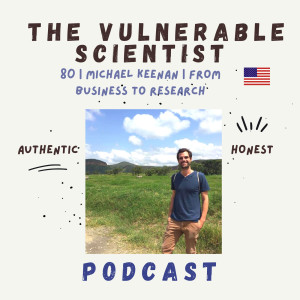
Monday Mar 28, 2022
Monday Mar 28, 2022
Michael Keenan is PhD Candidate at Wageningen University and Research. His dissertation focuses on understanding how risk and market access affect smallholder farmers’ marketing and investment decisions, agricultural households’ livelihoods, and internal conflict within agricultural-based economies. To understand these relationships, His research combines behavioral, theoretical, and empirical analysis at the intra-household level, household-level, and mesoeconomic level. He is passionate about applying quantitative methods and big data to a range of economic development issues. His research is now expanding into understanding gender gaps in smallholder agriculture, urban migration patterns in Sub-Saharan Africa, and the effects of digital innovations on rural areas' food systems. He has been based in Nairobi, Kenya for the past three years and has experience conducting research in Ethiopia, Kenya, Rwanda, Uganda, and Tanzania. I enjoy travelling, reading, and spending time with friends and family.In this episode, He talks about his journey into research from a business course.The Vulnerable Scientist is a Kenyan-based podcast that focuses on scientists' stories about their daily lives, work, and how they got to where they are. I am your host Sarah Nyakeri, a scientist, informal science communicator and a hiker. I am a multidisciplinary individual that does digital marketing and website design during my free time.The main questions asked that scientists are expected to answer vulnerable are: How are you, Introduce yourself, how did you become a scientist, What are the highs and lows you have experienced in your science career, tell the listeners about your hobbies, what question would you like to answer that has not been asked and how do you feel after having this conversation.Why did I start this podcast? You might ask. When doing my MSc project, my experiments started to fail at a certain period and it was very frustrating. I thought, If I finally get a new vaccine target for CBPP in cows, it would be all smiles but no one will ever know what I went through. I also wondered how many scientists were going through the same rough patch but did not openly talk about it?One day when I had just had a rough day, I talked into a mic about my day and I felt better. That was the first episode. At first, I thought it would just be journalling but after some fellow scientists heard it, they wanted to be Vulnerable too. Since then I have brought scientists from different fields to tell their stories of the highs and lows they have experienced with honesty and authenticity being the lead of our informal and long conversations.If you want to be Vulnerable on the show, send me an audio message either on speak pipe (https://www.speakpipe.com/VulnerableScientistVoicemail ) or anchor (https://anchor.fm/thevulnerablescientist/message). Feel free to reach out too if you want to talk about a certain topic in the science career space or anything as a scientist that might have nothing to with science but affects scientists. The podcast is on social media @TVscientistPod and Website; TheVulnerablescientist.com. You can support the show (https://www.patreon.com/thevulnerablescientist) on Patreon or Paypal sarahnyanchera(at)gmail or Mpesa at (254)0718896962 under Sarah Nyakeri. See acast.com/privacy for privacy and opt-out information.
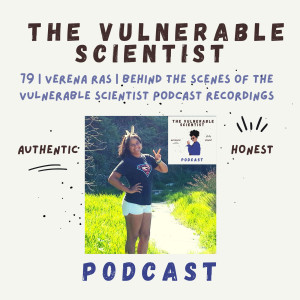
Friday Mar 25, 2022
Friday Mar 25, 2022
Verena Ras is Bioinformatics Training Coordinator, Co-chair Training and Education Working Group at H3Abionet, Chair - Sample Collection and Processing Sub-committee at the African BioGenome Project and a PhD candidate doing marine Taxonomy. Her work is trying to put Africa on the map in matters Jelly Fish.In this episode, I point out what happens behind any podcast recording using Verena as an example. This is to promote transparency of how the recordings are done and also to give a glimpse of what it takes to have an episode out.The Vulnerable Scientist is a Kenyan-based podcast that focuses on scientists' stories about their daily lives, work, and how they got to where they are. I am your host Sarah Nyakeri, a scientist, informal science communicator and a hiker. I am a multidisciplinary individual that does digital marketing and website design during my free time.The main questions asked that scientists are expected to answer vulnerable are: How are you, Introduce yourself, how did you become a scientist, What are the highs and lows you have experienced in your science career, tell the listeners about your hobbies, what question would you like to answer that has not been asked and how do you feel after having this conversation.Why did I start this podcast? You might ask. When doing my MSc project, my experiments started to fail at a certain period and it was very frustrating. I thought, If I finally get a new vaccine target for CBPP in cows, it would be all smiles but no one will ever know what I went through. I also wondered how many scientists were going through the same rough patch but did not openly talk about it?One day when I had just had a rough day, I talked into a mic about my day and I felt better. That was the first episode. At first, I thought it would just be journalling but after some fellow scientists heard it, they wanted to be Vulnerable too. Since then I have brought scientists from different fields to tell their stories of the highs and lows they have experienced with honesty and authenticity being the lead of our informal and long conversations.I enjoy asking questions since I am a naturally curious person. Feedback from the audience, including scientists and non-scientists, is the main motivation I message scientists or accept their request to be on the podcast, schedule an interview, edit audio, design the artwork, post it, and share it on social media platforms. It is a full-time job that requires me to spend from my pocket with no monetary returns, but I enjoy it.If you want to be Vulnerable on the show, send me an audio message either on speak pipe (https://www.speakpipe.com/VulnerableScientistVoicemail ) or anchor (https://anchor.fm/thevulnerablescientist/message). Feel free to reach out too if you want to talk about a certain topic in the science career space or anything as a scientist that might have nothing to with science but affects scientists. The podcast is on social media @TVscientistPod and Website; TheVulnerablescientist.com. You can support the show (https://www.patreon.com/thevulnerablescientist) on Patreon or Paypal sarahnyanchera(at)gmail or Mpesa at (254)0718896962 under Sarah Nyakeri. See acast.com/privacy for privacy and opt-out information.
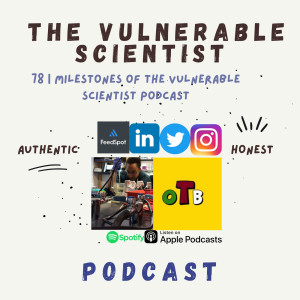
Thursday Mar 24, 2022
Thursday Mar 24, 2022
In this podcast, I talk about how the community has been growing and the need to do more with podcasts. I also mention what keeps me going.https://twitter.com/utm_org/status/1508650338370428929?s=20&t=3UOX1l-qpJ8S-ZkJ6MY8dA https://otbpodke.wordpress.com/2022/01/23/todays-podcast-is-the-vulnerable-scientist/The Vulnerable Scientist is a Kenyan-based podcast that focuses on scientists' stories about their daily lives, work, and how they got to where they are. I am your host Sarah Nyakeri, a scientist, informal science communicator and a hiker. I am a multidisciplinary individual that does digital marketing and website design during my free time.The main questions asked that scientists are expected to answer vulnerable are: How are you, Introduce yourself, how did you become a scientist, What are the highs and lows you have experienced in your science career, tell the listeners about your hobbies, what question would you like to answer that has not been asked and how do you feel after having this conversation.Why did I start this podcast? You might ask. When doing my MSc project, my experiments started to fail at a certain period and it was very frustrating. I thought, If I finally get a new vaccine target for CBPP in cows, it would be all smiles but no one will ever know what I went through. I also wondered how many scientists were going through the same rough patch but did not openly talk about it?One day when I had just had a rough day, I talked into a mic about my day and I felt better. That was the first episode. At first, I thought it would just be journalling but after some fellow scientists heard it, they wanted to be Vulnerable too. Since then I have brought scientists from different fields to tell their stories of the highs and lows they have experienced with honesty and authenticity being the lead of our informal and long conversations.I enjoy asking questions since I am a naturally curious person. Feedback from the audience, including scientists and non-scientists, is the main motivation I message scientists or accept their request to be on the podcast, schedule an interview, edit audio, design the artwork, post it, and share it on social media platforms. It is a full-time job that requires me to spend from my pocket with no monetary returns, but I enjoy it.If you want to be Vulnerable on the show, send me an audio message either on speak pipe (https://www.speakpipe.com/VulnerableScientistVoicemail ) or anchor (https://anchor.fm/thevulnerablescientist/message). Feel free to reach out too if you want to talk about a certain topic in the science career space or anything as a scientist that might have nothing to with science but affects scientists. The podcast is on social media @TVscientistPod and Website; TheVulnerablescientist.com. You can support the show (https://www.patreon.com/thevulnerablescientist) on Patreon or Paypal sarahnyanchera(at)gmail or Mpesa at (254)0718896962 under Sarah Nyakeri. See acast.com/privacy for privacy and opt-out information.
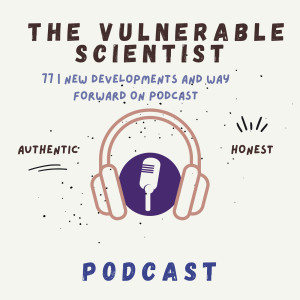
Wednesday Mar 23, 2022
Wednesday Mar 23, 2022
In this episode, I talk about the production limitations that I am currently facing in regards to the podcast Vulnerably and call on for support of you as a listener in any way possible. https://linktr.ee/ThevulnerablescientistThe Vulnerable Scientist is a Kenyan-based podcast that focuses on scientists' stories about their daily lives, work, and how they got to where they are. I am your host Sarah Nyakeri, a scientist, informal science communicator and a hiker. I am a multidisciplinary individual that does digital marketing and website design during my free time.The main questions asked that scientists are expected to answer vulnerable are: How are you, Introduce yourself, how did you become a scientist, What are the highs and lows you have experienced in your science career, tell the listeners about your hobbies, what question would you like to answer that has not been asked and how do you feel after having this conversation.Why did I start this podcast? You might ask. When doing my MSc project, my experiments started to fail at a certain period and it was very frustrating. I thought, If I finally get a new vaccine target for CBPP in cows, it would be all smiles but no one will ever know what I went through. I also wondered how many scientists were going through the same rough patch but did not openly talk about it?One day when I had just had a rough day, I talked into a mic about my day and I felt better. That was the first episode. At first, I thought it would just be journalling but after some fellow scientists heard it, they wanted to be Vulnerable too. Since then I have brought scientists from different fields to tell their stories of the highs and lows they have experienced with honesty and authenticity being the lead of our informal and long conversations.I enjoy asking questions since I am a naturally curious person. Feedback from the audience, including scientists and non-scientists, is the main motivation I message scientists or accept their request to be on the podcast, schedule an interview, edit audio, design the artwork, post it, and share it on social media platforms. It is a full-time job that requires me to spend from my pocket with no monetary returns, but I enjoy it.If you want to be Vulnerable on the show, send me an audio message either on speak pipe (https://www.speakpipe.com/VulnerableScientistVoicemail ) or anchor (https://anchor.fm/thevulnerablescientist/message). Feel free to reach out too if you want to talk about a certain topic in the science career space or anything as a scientist that might have nothing to with science but affects scientists. The podcast is on social media @TVscientistPod and Website; TheVulnerablescientist.com. You can support the show (https://www.patreon.com/thevulnerablescientist) on Patreon or Paypal sarahnyanchera(at)gmail or Mpesa at (254)0718896962 under Sarah Nyakeri. See acast.com/privacy for privacy and opt-out information.
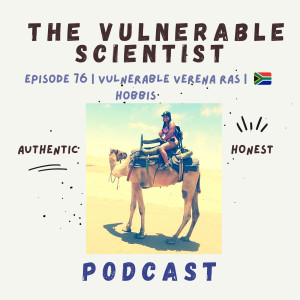
Tuesday Mar 22, 2022
Tuesday Mar 22, 2022
Verena Ras is Bioinformatics Training Coordinator, Co-chair Training and Education Working Group at H3Abionet, Chair - Sample Collection and Processing Sub-committee at the African BioGenome Project and a PhD candidate doing marine Taxonomy. Her work is trying to put Africa on the map in matters Jelly Fish.In this episode, Verena talks about the things she does when she is not working, her hobbies.The Vulnerable Scientist is a Kenyan-based podcast that focuses on scientists' stories about their daily lives, work, and how they got to where they are. I am your host Sarah Nyakeri, a scientist, informal science communicator and a hiker. I am a multidisciplinary individual that does digital marketing and website design during my free time.The main questions asked that scientists are expected to answer vulnerable are: How are you, Introduce yourself, how did you become a scientist, What are the highs and lows you have experienced in your science career, tell the listeners about your hobbies, what question would you like to answer that has not been asked and how do you feel after having this conversation.Why did I start this podcast? You might ask. When doing my MSc project, my experiments started to fail at a certain period and it was very frustrating. I thought, If I finally get a new vaccine target for CBPP in cows, it would be all smiles but no one will ever know what I went through. I also wondered how many scientists were going through the same rough patch but did not openly talk about it?One day when I had just had a rough day, I talked into a mic about my day and I felt better. That was the first episode. At first, I thought it would just be journalling but after some fellow scientists heard it, they wanted to be Vulnerable too. Since then I have brought scientists from different fields to tell their stories of the highs and lows they have experienced with honesty and authenticity being the lead of our informal and long conversations.I enjoy asking questions since I am a naturally curious person. Feedback from the audience, including scientists and non-scientists, is the main motivation I message scientists or accept their request to be on the podcast, schedule an interview, edit audio, design the artwork, post it, and share it on social media platforms. It is a full-time job that requires me to spend from my pocket with no monetary returns, but I enjoy it.If you want to be Vulnerable on the show, send me an audio message either on speak pipe (https://www.speakpipe.com/VulnerableScientistVoicemail ) or anchor (https://anchor.fm/thevulnerablescientist/message). Feel free to reach out too if you want to talk about a certain topic in the science career space or anything as a scientist that might have nothing to with science but affects scientists. The podcast is on social media @TVscientistPod and Website; TheVulnerablescientist.com. You can support the show (https://www.patreon.com/thevulnerablescientist) on Patreon or Paypal sarahnyanchera(at)gmail or Mpesa at (254)0718896962 under Sarah Nyakeri. See acast.com/privacy for privacy and opt-out information.
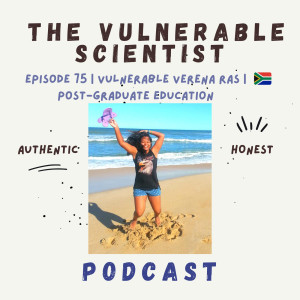
Monday Mar 21, 2022
Monday Mar 21, 2022
Verena Ras is Bioinformatics Training Coordinator, Co-chair Training and Education Working Group at H3Abionet, Chair - Sample Collection and Processing Sub-committee at the African BioGenome Project and a PhD candidate doing marine Taxonomy. Her work is trying to put Africa on the map in matters Jelly Fish.In this episode, Verena talks about her journey in postgraduate education despite not performing well in her undergraduate education. She also talks about how negative comments pushed her to pursue a PhD Education.The Vulnerable Scientist is a Kenyan-based podcast that focuses on scientists' stories about their daily lives, work, and how they got to where they are. I am your host Sarah Nyakeri, a scientist, informal science communicator and a hiker. I am a multidisciplinary individual that does digital marketing and website design during my free time.The main questions asked that scientists are expected to answer vulnerable are: How are you, Introduce yourself, how did you become a scientist, What are the highs and lows you have experienced in your science career, tell the listeners about your hobbies, what question would you like to answer that has not been asked and how do you feel after having this conversation.Why did I start this podcast? You might ask. When doing my MSc project, my experiments started to fail at a certain period and it was very frustrating. I thought, If I finally get a new vaccine target for CBPP in cows, it would be all smiles but no one will ever know what I went through. I also wondered how many scientists were going through the same rough patch but did not openly talk about it?One day when I had just had a rough day, I talked into a mic about my day and I felt better. That was the first episode. At first, I thought it would just be journalling but after some fellow scientists heard it, they wanted to be Vulnerable too. Since then I have brought scientists from different fields to tell their stories of the highs and lows they have experienced with honesty and authenticity being the lead of our informal and long conversations.I enjoy asking questions since I am a naturally curious person. Feedback from the audience, including scientists and non-scientists, is the main motivation I message scientists or accept their request to be on the podcast, schedule an interview, edit audio, design the artwork, post it, and share it on social media platforms. It is a full-time job that requires me to spend from my pocket with no monetary returns, but I enjoy it.If you want to be Vulnerable on the show, send me an audio message either on speak pipe (https://www.speakpipe.com/VulnerableScientistVoicemail ) or anchor (https://anchor.fm/thevulnerablescientist/message). Feel free to reach out too if you want to talk about a certain topic in the science career space or anything as a scientist that might have nothing to with science but affects scientists. The podcast is on social media @TVscientistPod and Website; TheVulnerablescientist.com. You can support the show (https://www.patreon.com/thevulnerablescientist) on Patreon or Paypal sarahnyanchera(at)gmail or Mpesa at (254)0718896962 under Sarah Nyakeri. See acast.com/privacy for privacy and opt-out information.
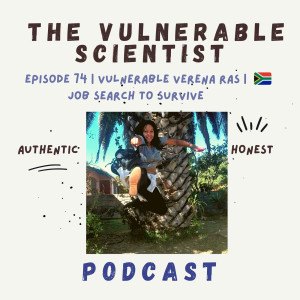
Friday Mar 18, 2022
Friday Mar 18, 2022
Verena Ras is Bioinformatics Training Coordinator, Co-chair Training and Education Working Group at H3Abionet, Chair - Sample Collection and Processing Sub-committee at the African BioGenome Project and a PhD candidate doing marine Taxonomy. Her work is trying to put Africa on the map in matters Jelly Fish.In this episode, Verena talks about how she has fought through her university life to find some sought of income just to be able to get through school.The Vulnerable Scientist is a Kenyan-based podcast that focuses on scientists' stories about their daily lives, work, and how they got to where they are. I am your host Sarah Nyakeri, a scientist, informal science communicator and a hiker. I am a multidisciplinary individual that does digital marketing and website design during my free time.The main questions asked that scientists are expected to answer vulnerable are: How are you, Introduce yourself, how did you become a scientist, What are the highs and lows you have experienced in your science career, tell the listeners about your hobbies, what question would you like to answer that has not been asked and how do you feel after having this conversation.Why did I start this podcast? You might ask. When doing my MSc project, my experiments started to fail at a certain period and it was very frustrating. I thought, If I finally get a new vaccine target for CBPP in cows, it would be all smiles but no one will ever know what I went through. I also wondered how many scientists were going through the same rough patch but did not openly talk about it?One day when I had just had a rough day, I talked into a mic about my day and I felt better. That was the first episode. At first, I thought it would just be journalling but after some fellow scientists heard it, they wanted to be Vulnerable too. Since then I have brought scientists from different fields to tell their stories of the highs and lows they have experienced with honesty and authenticity being the lead of our informal and long conversations.I enjoy asking questions since I am a naturally curious person. Feedback from the audience, including scientists and non-scientists, is the main motivation I message scientists or accept their request to be on the podcast, schedule an interview, edit audio, design the artwork, post it, and share it on social media platforms. It is a full-time job that requires me to spend from my pocket with no monetary returns, but I enjoy it.If you want to be Vulnerable on the show, send me an audio message either on speak pipe (https://www.speakpipe.com/VulnerableScientistVoicemail ) or anchor (https://anchor.fm/thevulnerablescientist/message). Feel free to reach out too if you want to talk about a certain topic in the science career space or anything as a scientist that might have nothing to with science but affects scientists. The podcast is on social media @TVscientistPod and Website; TheVulnerablescientist.com. You can support the show (https://www.patreon.com/thevulnerablescientist) on Patreon or Paypal sarahnyanchera(at)gmail or Mpesa at (254)0718896962 under Sarah Nyakeri. See acast.com/privacy for privacy and opt-out information.
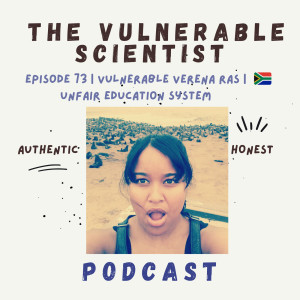
Thursday Mar 17, 2022
Thursday Mar 17, 2022
Verena Ras is Bioinformatics Training Coordinator, Co-chair Training and Education Working Group at H3Abionet, Chair - Sample Collection and Processing Sub-committee at the African BioGenome Project and a PhD candidate doing marine Taxonomy. Her work is trying to put Africa on the map in matters Jelly Fish.In this episode, she talks about her entering university as a first-gen and struggling to perform in tests in her university but enthusiastic when it came to practicals yet it was the course of choice that she was passionate about. She also talks about her experience how she conducts the bionformatics training. The Vulnerable Scientist is a Kenyan-based podcast that focuses on scientists' stories about their daily lives, work, and how they got to where they are. I am your host Sarah Nyakeri, a scientist, informal science communicator and a hiker. I am a multidisciplinary individual that does digital marketing and website design during my free time.The main questions asked that scientists are expected to answer vulnerable are: How are you, Introduce yourself, how did you become a scientist, What are the highs and lows you have experienced in your science career, tell the listeners about your hobbies, what question would you like to answer that has not been asked and how do you feel after having this conversation.Why did I start this podcast? You might ask. When doing my MSc project, my experiments started to fail at a certain period and it was very frustrating. I thought, If I finally get a new vaccine target for CBPP in cows, it would be all smiles but no one will ever know what I went through. I also wondered how many scientists were going through the same rough patch but did not openly talk about it?One day when I had just had a rough day, I talked into a mic about my day and I felt better. That was the first episode. At first, I thought it would just be journalling but after some fellow scientists heard it, they wanted to be Vulnerable too. Since then I have brought scientists from different fields to tell their stories of the highs and lows they have experienced with honesty and authenticity being the lead of our informal and long conversations.I enjoy asking questions since I am a naturally curious person. Feedback from the audience, including scientists and non-scientists, is the main motivation I message scientists or accept their request to be on the podcast, schedule an interview, edit audio, design the artwork, post it, and share it on social media platforms. It is a full-time job that requires me to spend from my pocket with no monetary returns, but I enjoy it.If you want to be Vulnerable on the show, send me an audio message either on speak pipe (https://www.speakpipe.com/VulnerableScientistVoicemail ) or anchor (https://anchor.fm/thevulnerablescientist/message). Feel free to reach out too if you want to talk about a certain topic in the science career space or anything as a scientist that might have nothing to with science but affects scientists. The podcast is on social media @TVscientistPod and Website; TheVulnerablescientist.com. You can support the show (https://www.patreon.com/thevulnerablescientist) on Patreon or Paypal sarahnyanchera(at)gmail or Mpesa at (254)0718896962 under Sarah Nyakeri. See acast.com/privacy for privacy and opt-out information.
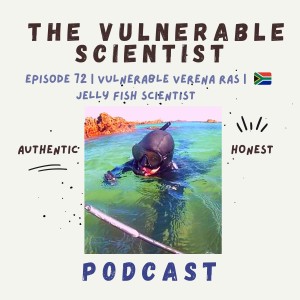
Wednesday Mar 16, 2022
Wednesday Mar 16, 2022
Verena Ras is Bioinformatics Training Coordinator, Co-chair Training and Education Working Group at H3Abionet, Chair - Sample Collection and Processing Sub-committee at the African BioGenome Project and a PhD candidate doing marine Taxonomy.Her work is trying to put Africa on the map in matters Jelly Fish.The Vulnerable Scientist is a Kenyan-based podcast that focuses on scientists' stories about their daily lives, work, and how they got to where they are. I am your host Sarah Nyakeri, a scientist, informal science communicator and a hiker. I am a multidisciplinary individual that does digital marketing and website design during my free time.The main questions asked that scientists are expected to answer vulnerable are: How are you, Introduce yourself, how did you become a scientist, What are the highs and lows you have experienced in your science career, tell the listeners about your hobbies, what question would you like to answer that has not been asked and how do you feel after having this conversation.Why did I start this podcast? You might ask. When doing my MSc project, my experiments started to fail at a certain period and it was very frustrating. I thought, If I finally get a new vaccine target for CBPP in cows, it would be all smiles but no one will ever know what I went through. I also wondered how many scientists were going through the same rough patch but did not openly talk about it?One day when I had just had a rough day, I talked into a mic about my day and I felt better. That was the first episode. At first, I thought it would just be journalling but after some fellow scientists heard it, they wanted to be Vulnerable too. Since then I have brought scientists from different fields to tell their stories of the highs and lows they have experienced with honesty and authenticity being the lead of our informal and long conversations.I enjoy asking questions since I am a naturally curious person. Feedback from the audience, including scientists and non-scientists, is the main motivation I message scientists or accept their request to be on the podcast, schedule an interview, edit audio, design the artwork, post it, and share it on social media platforms. It is a full-time job that requires me to spend from my pocket with no monetary returns, but I enjoy it.If you want to be Vulnerable on the show, send me an audio message either on speak pipe (https://www.speakpipe.com/VulnerableScientistVoicemail ) or anchor (https://anchor.fm/thevulnerablescientist/message). Feel free to reach out too if you want to talk about a certain topic in the science career space or anything as a scientist that might have nothing to with science but affects scientists. The podcast is on social media @TVscientistPod and Website; TheVulnerablescientist.com. You can support the show (https://www.patreon.com/thevulnerablescientist) on Patreon or Paypal sarahnyanchera(at)gmail or Mpesa at (254)0718896962 under Sarah Nyakeri. See acast.com/privacy for privacy and opt-out information.
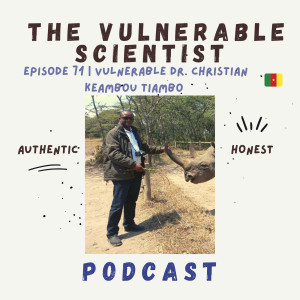
Tuesday Mar 15, 2022
Tuesday Mar 15, 2022
Dr, Christian Tiambo is a Cameroonian Scientist. Livestock Genetics/Genomics: Precision Breeding and Reproductive Technologies, Biobanking management, Access & Benefits Sharing Officer CTLGH/ILRI based in Kenya.The Vulnerable Scientist is a Kenyan-based podcast that focuses on scientists' stories about their daily lives, work, and how they got to where they are. I am your host Sarah Nyakeri, a scientist, informal science communicator and a hiker. I am a multidisciplinary individual that does digital marketing and website design during my free time.The main questions asked that scientists are expected to answer vulnerable are: How are you, Introduce yourself, how did you become a scientist, What are the highs and lows you have experienced in your science career, tell the listeners about your hobbies, what question would you like to answer that has not been asked and how do you feel after having this conversation.Why did I start this podcast? You might ask. When doing my MSc project, my experiments started to fail at a certain period and it was very frustrating. I thought, If I finally get a new vaccine target for CBPP in cows, it would be all smiles but no one will ever know what I went through. I also wondered how many scientists were going through the same rough patch but did not openly talk about it?One day when I had just had a rough day, I talked into a mic about my day and I felt better. That was the first episode. At first, I thought it would just be journalling but after some fellow scientists heard it, they wanted to be Vulnerable too. Since then I have brought scientists from different fields to tell their stories of the highs and lows they have experienced with honesty and authenticity being the lead of our informal and long conversations.I enjoy asking questions since I am a naturally curious person. Feedback from the audience, including scientists and non-scientists, is the main motivation I message scientists or accept their request to be on the podcast, schedule an interview, edit audio, design the artwork, post it, and share it on social media platforms. It is a full-time job that requires me to spend from my pocket with no monetary returns, but I enjoy it.If you want to be Vulnerable on the show, send me an audio message either on speak pipe (https://www.speakpipe.com/VulnerableScientistVoicemail ) or anchor (https://anchor.fm/thevulnerablescientist/message). Feel free to reach out too if you want to talk about a certain topic in the science career space or anything as a scientist that might have nothing to with science but affects scientists. The podcast is on social media @TVscientistPod and Website; TheVulnerablescientist.com. You can support the show (https://www.patreon.com/thevulnerablescientist) on Patreon or Paypal sarahnyanchera(at)gmail or Mpesa at (254)0718896962 under Sarah Nyakeri. See acast.com/privacy for privacy and opt-out information.
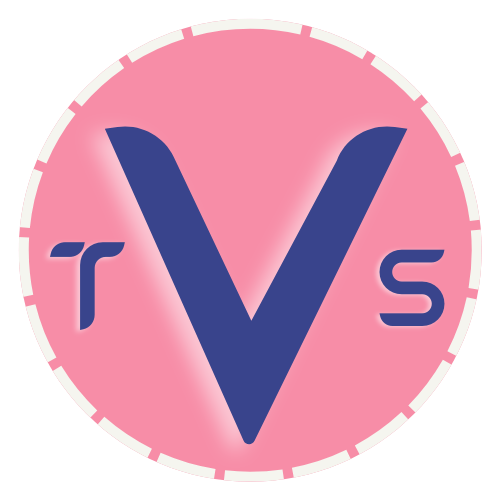
About
Only scientists who are honest and authentic or are working towards it will be on this podcast.
Professor Brene Brown’s research shows that vulnerability fosters good emotional and mental health. It is a sign of courage. We become more resilient and brave when we embrace who we truly are and what we are feeling. The Vulnerable Scientist Podcast is a space for scientists to tell their honest and authentic stories.
I am your host Sarah Nyakeri who happens to be a scientist, and Informal science communicator and I help scientists create personal websites.
If you want to support this show, go to www.patreon.com/thevulnerablescientist.com You can also follow this podcast on all social media platforms @TVScientistPod
